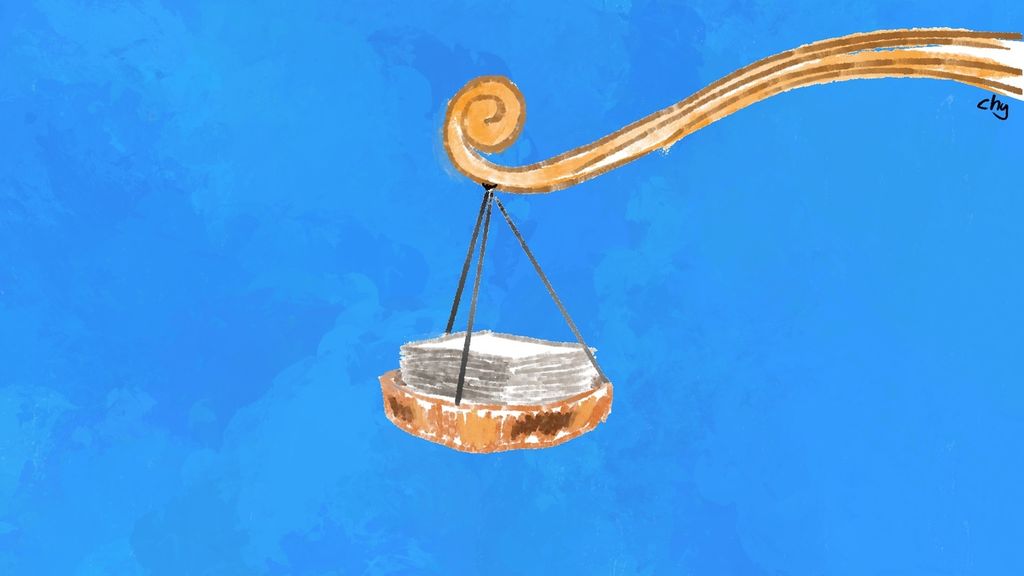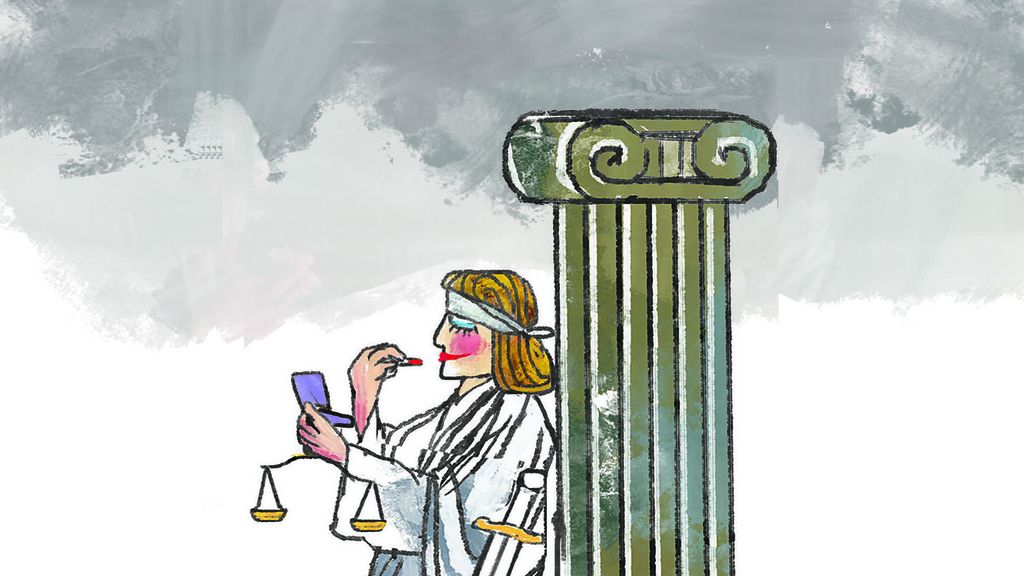Emergency Legal Reform
People are well aware of the sentiments and the sociopolitical circumstances that have prompted the executive statement.
.

In the wake of the widely circulating news about a supreme justice being implicated in a bribery case, President Joko “Jokowi” Widodo has pointed out the need for legal reform.
A national publication raised the issue in its editorial column and, in a more demanding fashion than the President, saw the legal reform as “urgent”. In its headline story, it said that the suggested legal reform should not be merely lip service.
People are well aware of the sentiments and the sociopolitical circumstances that have prompted the executive statement. The malfeasance has sparked shock, dismay and exasperation among the public. Above all, what exactly is the object of reform and how should it be handled?
Also read:
> The Fading of the Integrity and Ethics of Law Enforcers
> Law Enforcement Discrimination
People have expressed their disappointment that a law-enforcement officer and justice guardian has ruined the value of dignity by accepting bribes. The position receives the acknowledgment of "Your Honor", but the behavior is by no means honorable; such a ridicule ensues.
In light of past incidents, the public sees that corrupt behavior, especially in the form of taking bribes, is rife. No less, no more.
It has become an open secret, not only in the Supreme Court (MA) and Constitutional Court (MK), but also in the lower-tier judicial institutions, involving affairs in the criminal, civil, state administration and even religious litigation. It would be unfair if the disappointment was not aimed at other law enforcement officials and institutions, including the prosecutor's office and police. The disease exists. In light of past incidents, the public sees that corrupt behavior, especially in the form of taking bribes, is rife. No less, no more.
Use simple narratives
So, what must be reformed? Is not the law like heaven, which is intangible? Or what is meant by the law and its statutory instruments? What should be done with uncodified laws? When it comes to codified laws and regulations, is not legal reform a perennial issue? There is a mockery about law being in obesity. Non-procedural legislation process has seen a bill enacted into law “in the morning” only to be revoked “in the afternoon”. It appears that it later needs correction or amendment, or faces judicial contention at the Constitutional Court.

So chaotic was the legal system, the President once suggested an idea -- although not necessarily effective -- to form a national-legislation agency. It was all triggered by the absence of what is called statutory politics as a major design for the national legislation program (prolegnas). It also owed to our negligence in building the technical capabilities of our legislators.
Those are the fundamental problems we are facing, are we not?
The time is a long way off when this issue of legislation will be linked with the public's disappointment and cry for legal reform. Then, what is to be reformed? Is it about human attitudes and behavior, especially the mental shape of judiciary apparatus? Or, is it related to low discipline within our society, or poor perception about and compliance with the rules? Those are the fundamental problems we are facing, are we not?
Delving into those problems seems to be entering a familiar array, in which we may end up in banal and boring discourse, and must be willing to engage the broad and complex spectrum of human development. There has been a rave of discourses about it via seminars and studies. In fact, the other day -- perhaps being still relevant today -- the slogan of mental revolution was proclaimed out loud only to become quiet. Where it has started seems to be unclear for many. What is clear is that mental revolution is only an intent of conscience.
”Reinvent Indonesia”
By opening their mental horizons and being straightforward in approach, people will see the problem does revolve around an obvious cause, which is mentality! Everyone knows it is about our poor quality of attitude and low social discipline. We show lack of empathy for the conditions of our social life and for state governance.

From the perspective of investment, we are to set aside resources to build a new and better generation. We must have the courage and determination to be willing to "reinvent Indonesia". It is almost impossible to build mentality, self-identity, character and personality through revolutionary process.
After all, have we ever tweaked out about viable building foundation and infrastructure without being bogged down in debates and discourses on regulations regarding national education, which are in fact everchanging, with no sound concept nor clearly defined end goal?
Voicing political and populist thoughts is indeed a handy undertaking. However, experiences have shown that it will only stir social emotions and sentiments in the end. What and where the output, is unknown -- other than just in discourse.
Do we not end up being trapped in our own bewilderment?
We have a lot of communal knowledge about reform, not restricted to the fields of military and police. There are other fields that call for reform with the life of the nation and state on the line. However, reflecting on 20 years of our reformation era, many of us concede that the so-called reforms have been just slogans. The application may have been pursued, but without a plan, direction, targets or working stages. Do we not end up being trapped in our own bewilderment?
Therefore, regarding the suggested legal reform, it is better to avoid using terms or jargon which, although effective for political purposes, are not easy to be translated into practicality. Let us say it in a straightforward way, what our problem is and how to fix it.
If the problem lies in people’s perspective, attitude and obedience to the law, it is better to be made the consensus for resolution as soon as possible why this is so. When it relates to the degraded or low social discipline of our society, look for the roots. If the problem lies in the increasingly narrow-minded society, in which people opt for a shortcut and go for whatever means in their search for a comfortable and stable life, there must also be the correctional formula.

For sure is that no results could be conjured in a hand flip. If the problem lies in the tendency of the ranks in governmental, political or regulatory institutions abusing authority to enrich themselves, it must also have its own measure. There are many more.
Human quality and supervision
However, drawn together on a common thread, all is rooted in human quality. This quality can be interpreted as ethics and mentality in social interaction and attitude toward the state. It is our quality in carrying out our role as citizens to contribute to the sustainability of political and social life in order and peace -- how to improve and build ourselves as a nation, and what is the most appropriate path. As a nation, we must be able to formulate these concepts and steps together.
Even if emergency measures are needed, focused on the attitude and behavior of state apparatus -- in bureaucracy, law enforcement institutions and the framework of creating national security -- try to question it with sincerity: Are the technical-education and training programs and curricula or career promotion currently being implemented still carried out in a sustainable and scheduled manner?
Institutions’ leaders should increase attention and supervision to ensure the weak points could be addressed properly and objectively.
Training programs, with priority on ethical and professional development, are crucial for them. Institutions’ leaders should increase attention and supervision to ensure the weak points could be addressed properly and objectively.
Too often have we heard about cynicism in society: how the function of supervision, both external and internal, is not running optimally. The leaders should voice the priority on operational achievements internally. The habit of lenient supervision and assessment that is mutually favorable should be avoided. Apart from that, there is another factor that leads to stagnation in function, which is the mentality hidden under "for the sake of the good name of the institution" and "corps solidarity".
/https%3A%2F%2Fasset.kgnewsroom.com%2Fphoto%2Fpre%2F2018%2F07%2F10%2F7c7b2d7f-e2f6-4bd5-8e9c-ab03afa0c7c8_jpg.jpg)
Bambang Kesowo
Bambang Kesowo,Chairman of Advisory Board of National Resilience Institute (Lemhannas) Alumni Association; Postgraduate Lecturer of School of Law, Gadjah Mada University (UGM)
(This article was translated by Musthofid)